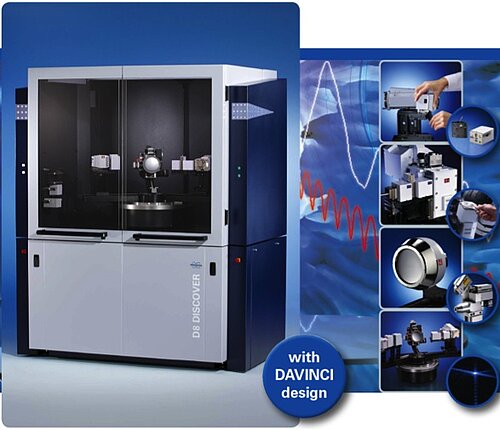HR-XRD (Bruker)
High-Resolution X-Ray Diffractometer (HR-XRD)

Applications
- High resolution X-ray diffraction:
- Analysis of out of plane lattice constant
- Crystalline quality of the sample
- Strain analysis
- X-ray Reflectometrie:
- Determination of film thickness
- Surface and interface roughness
- Gracining incidence x-ray diffraction:
- Analysis of in plane lattice constant
- Fast reciprocal space mapping
- Temperature dependent measurements:
- Analysis of structural phase transitions
Specifications
- Primary side:
- X-ray source: Cu ceramic tube, output 2.2 kW; parallel beam by Göbel mirror
- Monochromators: 2 bounce Ge (220a) beamdivergence: 0.0085°; 2 bounce Ge (004a) beamdivergence: 0.0045°; 4 bounce Ge (220s) beamdivergence: 0.0033°
- Horizontal Goniometer:
- Theta axis: usable angle range -4° to 170°
- Smallest stepsize: 0.0001°
- Chi axis: useable angle range: - 11° - 98°
- Phi axis: unlimited
- Sample stage:
- x,y: - 40 – 40 mm; z: 2 mm (expandable up to 40 mm)
- Sample weight restricted to 1 kg
- Secondary side:
- Scintillation counter: max. 2x106 cps
- 0D/1D detector (Lynxeye):
- Detector window: 3° of 2 Theta
- Adjustable optic path: variable slit; 3 bounce Ge(022) analyser crystal
- Various sample stages:
- Vacuum stage
- Tilt stage with two degrees of freedom: ± 7°; steps:0.01°
- Temperature stage: -100°C to 350°C at p = 10-2 to 1300 mbar


